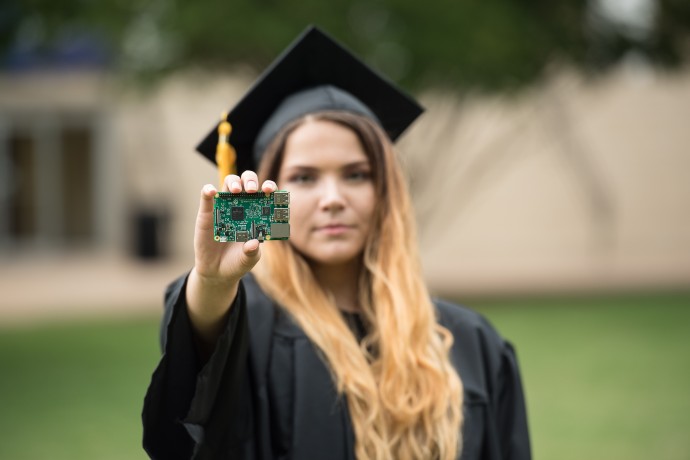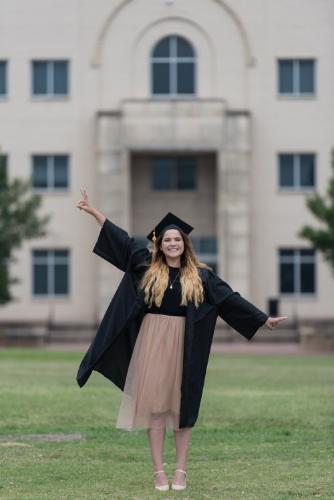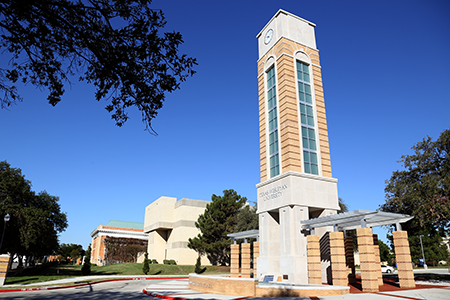Texas Wesleyan Grad Leads Cybersecurity Innovation at Baylor

Dr. Erika Leal ’18 is dismantling the myth that cybersecurity is some impenetrable "secret"—she's living proof that anyone can break into this field with the right support; and she's especially passionate about paving the way for other women to join her.
Leal's fascination with computers began in the Windows 95 and MySpace era. A self-described tinkerer, she would intentionally "break" her computer, even introducing viruses, just to teach herself how to fix it. "We didn’t have cell phones, so I couldn’t look up how to fix it on Google,” she laughed. “I had to figure it out as is, and it got me interested.”
Leal came to Texas Wesleyan University to study computer science in 2015 after transferring from a larger college where she was “getting lost in the translation with all the students.” Her sister had attended TXWES and told her about the small class sizes and close-knit community that allows professors to truly connect with their students.
 Despite initially doubting her abilities, Leal's professors recognized her talent early on, encouraging her to pursue graduate studies. “If it hadn’t been for professors like Dr. Zhang believing in me, then I don’t know if I would have excelled. I needed somebody to believe in me, make it accessible to me, and that’s what Texas Wesleyan did,” she said. This kind of support is crucial, Leal believes, especially for women navigating fields where they are underrepresented.
Despite initially doubting her abilities, Leal's professors recognized her talent early on, encouraging her to pursue graduate studies. “If it hadn’t been for professors like Dr. Zhang believing in me, then I don’t know if I would have excelled. I needed somebody to believe in me, make it accessible to me, and that’s what Texas Wesleyan did,” she said. This kind of support is crucial, Leal believes, especially for women navigating fields where they are underrepresented.
That belief propelled her to earn a Ph.D. in 2024 through a bachelor's to Ph.D. pathway at Tulane University and the University of Texas at Arlington. Now, Dr. Leal has come full circle, starting her career as an assistant professor at Baylor University. She teaches cybersecurity, conducts research and serves as the research director of the Central Texas Cyber Range. This dual focus on teaching and research is something Leal embraces, noting that it's a "50/50" split typical for research professors. She sees her role not just as an instructor, but as a mentor and role model, particularly for young women considering careers in computing.
Her current research focuses on innovative methods for identifying and analyzing malware—software designed to cripple computers or networks—and cyber-physical systems (CPS), which integrate physical components with computational algorithms and sensors to control and monitor physical processes. “There’s a lot of exploration there,” she said. “Cyber-Physical Systems are all throughout our life, so there’s a huge need for not only protecting them but also trying to decipher what vulnerabilities they have.”
Recognizing the vulnerability of senior citizens to cyberattacks, Leal is also collaborating with a non-profit to develop educational workshops for this demographic. “Most often, it’s our seniors who get victimized for cyber security attacks,” she said. This is a critical need, as evidenced by the FBI's Internet Crime Complaint Center (IC3) reporting over $3.4 billion in losses to cybercrime for seniors aged 60 and older in 2023.
Leal’s hope is that not only can she help seniors but also pave the way for other women to join STEM careers. She mentioned that even in the classes she teaches and the ones she attended while she was in school mostly only have a couple of female students.
“There have been times people doubted my work, saying ‘there’s no way you could’ve programmed that,’” she said. “You must be confident in your skills and believe in yourself; you can’t become dissuaded. I personally want women to join this field. We can do it!”
Leal hopes that her presence and achievements at Baylor, including her leadership role at the Cyber Range, will inspire a new generation of women to pursue their passions in cybersecurity and other STEM fields.
Learn more about Texas Wesleyan’s bachelor’s of computer science program or master’s in computer science degree, where you can get one-on-one mentorships with professors like Dr. Zhang.








